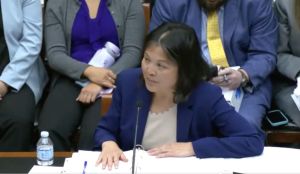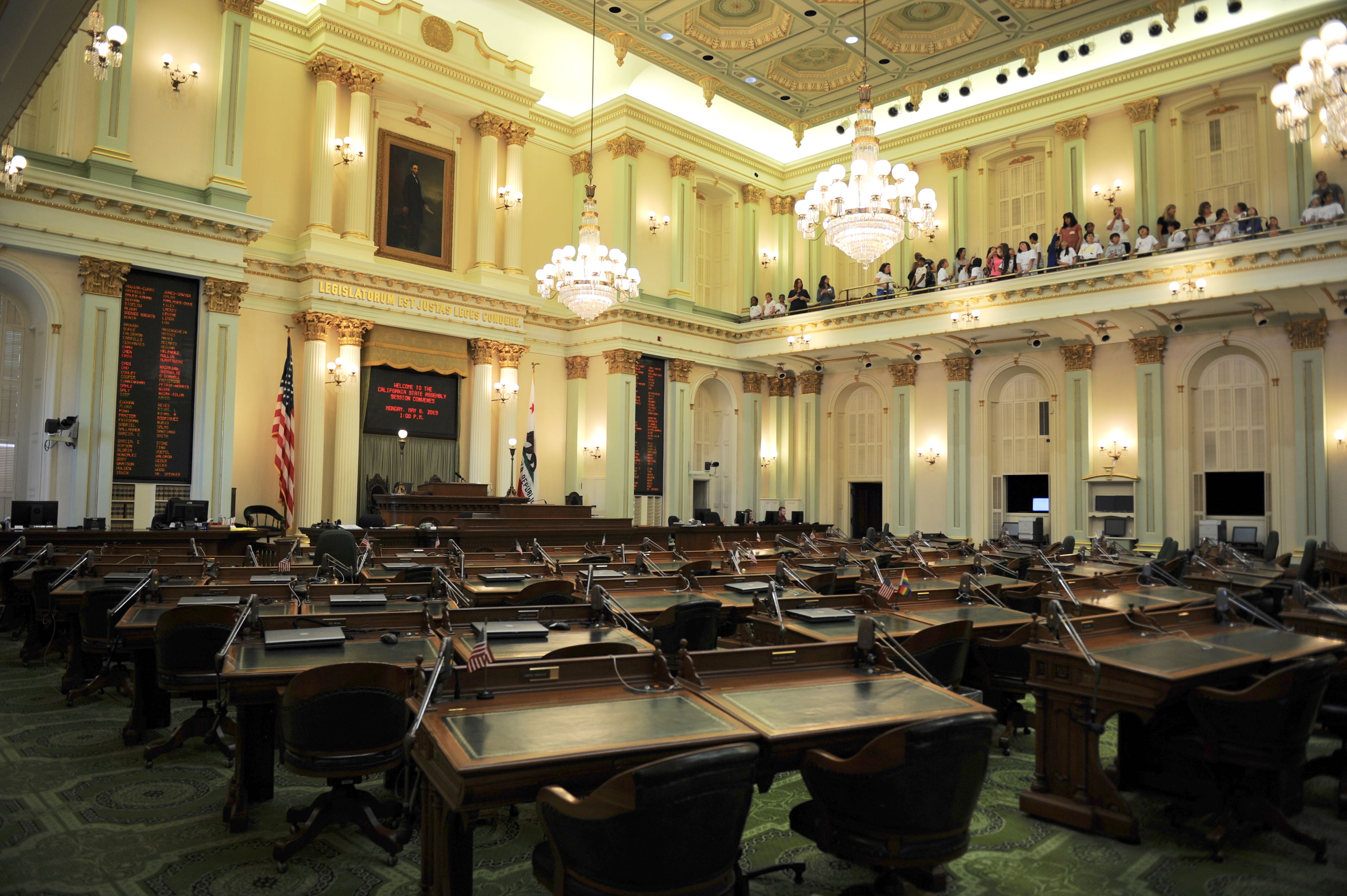
Kamala Harris speaking at National Forum on Wages and Working People in Las Vegas, NV, April 27, 2019. (Photo by Gage Skidmore)
No, Kamala – She’s Still Acting
Despite confirmation limbo, Julie Su planning to rewrite labor rules
By Thomas Buckley, August 13, 2023 9:15 am
On Tuesday, Vice President Kamala Harris decided to put her own spin on the constitution, declaring that she will not refer to Acting Secretary of Labor Julie Su as “Acting” anymore.
Su is deemed “acting” because the Senate – of which Harris was a member and still votes in to break a tie – will not give her the job on permanent basis

This was not a typical Harris “yellow buses are green that go into space and there is country named Poland near the future community” string of gibberish; she intentionally dropped the word:
“I’ll call her Labor secretary. I’m not going to say the word ‘acting,’” Harris said.
While this may seem like a bit of semantic silliness, it does carry meaning – the administration will stand by Su no matter, Harris is saying, even when she issues pro-Big Labor rules she may not actually be allowed to issue in the first place.
Case in point is the expected October issuance of a new Labor Department standard on how to classify independent contractors/freelancers/gig workers.
Su is intimately involved in this subject, having helped write and then zealously enforce California’s AB 5 law that topsy-turveyed the lives of millions of independent workers. And during her to-this-point incomplete Senate confirmation process she was asked repeatedly if she would favor a similar federal bill or regulation, to which she replied by mumbling something about how she wouldn’t do that exactly before trailing off into boiler plate non-responses.
For background, AB 5 involves what is called the ABC Test to determine if someone really should be an independent contractor or an actual direct employee (an actual direct employee that can be unionized, which is the point anyway.)
The test has three standards to make the determination, at least one of which would essentially classify almost every independent contractor as an employee.
In April, New Jersey-based writer and national freelancer advocate Kim Kavin testified in front of the House of Representatives Committee on Education and the Workforce Subcommittee on Workforce Protections, which is chaired by Rep. Kevin Kiley (R-Rocklin).
“As we all learned from the California chaos that resulted from nearly identical language becoming law in that state, it is not possible for many legitimate independent contractors to pass Part B of this ABC Test,” Kavin said.
She continued: “If self-employed Americans can’t be in the same line of business as our clients, then ask yourself: How can a writer ever sell an article to a publisher? How can a musician perform at a music venue? How can a comedian tell jokes at a comedy club? How can a graphic artist complete a design for a graphic-design company? How can a book editor edit a book for a book publisher? How can an owner-operator trucker haul goods for a trucking company? How can a translator provide translation services for a translation company? How can a tutor offer tutoring services for a tutoring company? How can a youth sports coach serve as a coach in a youth sports league? How can a forester provide consultation to a forestry company? How can a cartographer provide services to a map-making company? How can a demolitions expert consult on a construction project that includes a demolition?”
“The rule Su is expected to publish on October does not use the ABC Test per se, but the standards it does use allows federal regulators a noticeable amount of leeway when making an ’employee or contractor?’ determination,” said Michale Lotito of the Workplace Policy Institute.
In other words, whether or not a person is an employee or a contractor could lie in the eye of the beholding bureaucrat.
For her part, Kavin was blunt:
“Compare the ABC Test language of “the service is performed outside the usual course of the business of the employer” to the U.S. Department of Labor language of “critical, necessary, or central to the employer’s principal business,” asked Kavin. “Changing ‘usual’ to ‘principal’ doesn’t mask the wretched stink of the policy-making itself.”
Another part of the rule that appears to be clearly anti-worker is that it states if contracts are “routinely or automatically” renewed that could make the contractor an employee, with everything that entails.
What it means is that if a company likes a person’s work and hires them for multiple projects they could fall into the permanent employee trap.
This rule has been winding its way through regulatory purgatory for some time but is expected to be promulgated in October. From Su’s standing point of view, the timing may be critical if it wants to better withstand court challenges.
That’s because that while Su is considered by the administration to be “it” at the Labor Department, has no plans to nominate someone who could get confirmed, and has stated it thinks its legal to clearly circumvent the “advice and consent” clause of the United States constitution, opponents have other ideas.
Su’s standing – and henceforth her ability to make binding rules – is currently under review by the Government Accountability Office after Congresswoman Virginia Foxx (R-NC) asked the agency to look into the administration claim that – unlike almost all other “acting” appointments, which are for 210 days – there is no time limit on her “acting” status.
In other words, except for the extra word, she is it and it is purely coincidental the rule could go into effect just days before the 210-day time limit.
Rep. Kiley, who has bird dogged Su throughout the process because he’s from California and was appalled by AB 5, and the fact that Su lost $40 billion to fraud while she was overseeing the EDD as the state’s labor secretary during the pandemic, said he will work to derail any such negative enforcement possibilities.
“The Department of Labor’s proposed independent contractor rule, like AB 5 in California, would deprive millions of Americans of the opportunity to work independently and start their own business. I’ve secured an amendment in the Appropriations process to bar any funds from being used to implement the rule,” Kiley said. “In addition, the Administration is planning to keep Julie Su in place as an unconfirmed Acting Secretary indefinitely, so she can enforce the independent contractor rule just as ruthlessly as she enforced AB 5 as California’s Labor Secretary. (To that end) I have introduced the Department of Labor Succession Act to prevent this from happening and stop the Biden Administration’s end-run around the constitutional requirement of Senate confirmation.”
- Benefit Fraud Problems and Solutions - November 7, 2024
- A Little Exit Poll - November 5, 2024
- Tomorrow’s Headlines Today! - November 5, 2024





Kamala is also acting like she’s Vice President and in charge of her mental faculties, which she proves DAILY that she’s clearly NOT…